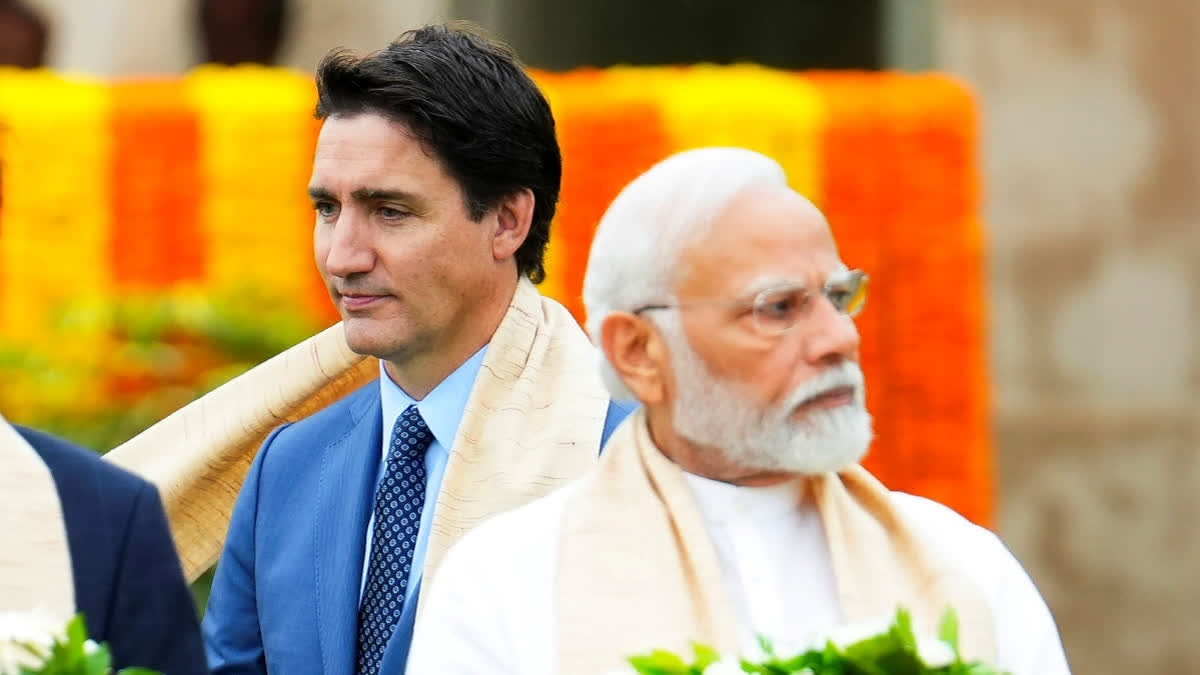New Delhi: The diplomatic row between India and Canada, sparked by allegations from Canadian Prime Minister Justin Trudeau that India may have been involved in the killing of a Sikh separatist leader, Hardeep Singh Nijjar, in British Columbia in June last year, has had far-reaching effects.
Both countries have expelled diplomats and suspended bilateral talks, adding to the uncertainty surrounding various sectors and communities in both nations. The latest escalation in tensions happened after India received a diplomatic communication from Canada last Sunday wherein it was mentioned that Indian High Commissioner Sanjay Kumar Verma and other Indian diplomats were 'persons of interest' in the investigation into the killing of Nijjar.
On Monday, India responded with a strongly-worded statement wherein it described the Canadian allegations as “preposterous imputations” and ascribed these to the political agenda of the Trudeau government that is centered around vote bank politics. By evening, the External Affairs Ministry summoned Canadian Charge d’Affaires Stewart Wheeler and informed him that "the baseless targeting of the Indian High Commissioner and other diplomats and officials in Canada was completely unacceptable".
"It was underlined that in an atmosphere of extremism and violence, the Trudeau Government’s actions endangered their safety," the Ministry said in a statement. “We have no faith in the current Canadian government’s commitment to ensure their security. Therefore, the Government of India has decided to withdraw the High Commissioner and other targeted diplomats and officials.”
Soon after, the Ministry issued another statement informing about the Government of India's decision to expel Charge d’Affaires Wheeler and five other senior Canadian diplomats from the country.
This total downgrading of diplomatic relations marks the culmination of a more than a year of charges and counter-charges between the two countries after Trudeau alleged in the Canadian parliament in September last year that there was an Indian hand in the killing of Nijjar.
New Delhi dismissed Trudeau’s allegations as “absurd and motivated”. “Such unsubstantiated allegations seek to shift the focus from Khalistani terrorists and extremists, who have been provided shelter in Canada and continue to threaten India's sovereignty and territorial integrity,” the External Affairs Ministry had said in a statement at that time.
This escalating tension is not just a geopolitical issue. It is affecting the lives of ordinary Canadian citizens and the large Indian diaspora in Canada.
With nearly 1.8 million people of Indian origin and another one million non-resident Indians, Canada hosts one of the largest Indian diaspora abroad, which account for more than 3 per cent of the country’s total population. The diaspora, whose main concentration is in the Greater Toronto Area, the Greater Vancouver area, Montreal (Quebec), Calgary (Alberta), Ottawa (Ontario) and Winnipeg (Manitoba) have contributed significantly to the Canadian economy and society.
There are numerous business and diaspora organisations, supporting enhanced bilateral relations between the two countries. The Indian diaspora, which includes a significant Sikh community, plays an important role in Canada’s multicultural fabric.
However, this community has become increasingly divided and uneasy in light of Khalistani separatists getting a safe haven in Canada. While a miniscule section of the Sikh diaspora in Canada supports the Sikh separatist cause that advocates for a homeland for Sikhs in Punjab, India, a majority of Indo-Canadians are opposed to it. The issue has deepened divisions within the diaspora.
